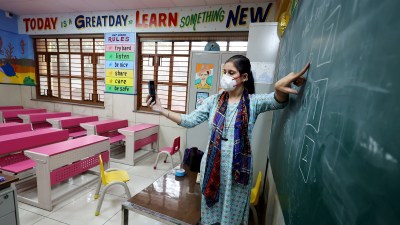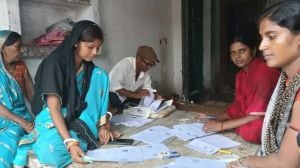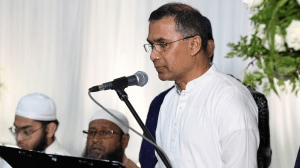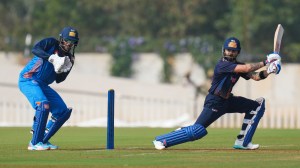A village resolves
A Haryana village takes the lead in spreading the message against female foeticide
Doctor nahi kasai tha/Li haath mein faansi thi/Ang ang kaat diye,tukde kar diye chaar/Jagat mein aa lene de He was not a doctor but a butcher/He had a noose in his hands/He cut her into four parts/Let her come into the world. Sheela croons the song she has written to highlight the evils of female foeticide. Sheela,in her sixties and illiterate,knows the message has to be sent out loud and strong: female foeticide has to stop.
Bibipur,which has a population of around 5,500,shot to fame after a khap mahapanchayat held on July 14 took a strong stand against female foeticide and demanded that murder charges be slapped against those who indulge in it. The khap leaders also stressed on creating social awareness on the issue. What made this mahapanchayat different from those held in the past was the participation of women in large numbers.
In Haryana,there are 877 women to 1,000 men and the child sex ratio 0-6 years is 830 girls to 1,000 boys,according to the 2011 Census. Haryana is among the worst five states and UTs in the country when it comes to the sex ratioit is ranked 31 among 35.
The mahapanchayat held recently has become the talking point in Bibipur. From a 10-year-old girl to ageing men and women,everyone is eager to ensure that they contribute to spreading the message against female foeticide.
The change came with Sunil Jaglan,who took over as Bibipur sarpanch two years ago,and his sister Ritu. Jaglan,who holds a number of degrees including BSc Computer Science,MSc Math,MA Education,MCA and a PhD,decided to contest the elections after he could not get the lane in front of his house repaired. After he took over as sarpanch,he launched many e-governance initiatives. Jaglan also got a group of students from class V to VIII together to conduct surveys. In exchange, he distributed solar lamps amongst them. One such survey that the students conducted revealed that there were around 50 unmarried men who had crossed the age of 35. Reason? They could not find suitable brides due to the skewed sex ratio. Some families even bought brides from UP and Bihar. Data collected three months ago showed the birth of 25 boys as against 14 girls.
This got Jaglan thinking. He soon started taking steps to get to the root of the problem. One of the steps he took was to get anganwadi workers to make a list of pregnant women who had taken their first tetanus shot but had not turned up for the second one. Women in the village usually got a sex determination test done on their foetus after the first injection and so,if someone hadnt come back for a second injection,it was probably because she had aborted the foetus.
A gram panchayat was held earlier in June this year where both men and women were present and the issue of female foeticide was discussed at length.
Around 250 women became part of the gram panchayat for the first time. This gradually set the stage for the mahapanchayat that was held this month. While women are usually not part of khap panchayats,a large number of women participated in the mahapanchayat,speaking on female foeticide and even presenting a play on the issue.
Women in the village have always taken on active roles. Besides taking care of household chores,they also work in the fields and look after the cattle. The village has a Doodh Utpadak Sehkari Samiti,a co-operative managed by 51 women which supplies milk to Jind. Poonam,secretary of the Samiti and a vocal advocate of the changes that are being brought about in the village,says that the campaign against female foeticide is gaining ground.
If people can be punished for killing human beings,those who kill foetuses should be punished as well. Girls are considered a burden by parents who feel they will have to give dowry to get them married. Parents also feel that boys will look after them in their old age. However,they should realise that if there are no girls,who will marry their sons? says Poonam.
As the survey revealed,the village has a large number of men who have crossed 35 years of age and have not been able to find a bride. In fact,a whole row of houses in the village is famous for housing bachelors. Villagers say no one is willing to get their daughters married into houses that have many sons. There have been one or two instances of brides who were bought from other states duping the husbands and vanishing with valuables. This,say the villagers,is proving to be a deterrent for the others to get brides from outside.
Some elderly members of the gram panchayat,who are opposed to inter-caste marriages,are not averse to marriages between the men in the village and girls from other states. Caste does not seem to be a consideration in such cases. Ram Kumar and Randhir Singh,members of the gram panchayat,say that women from other states have adjusted in the families they have married into. They also say that the fight against female foeticide has their full support. They are part of teams that will be going to different villages to create awareness on the issue.
Ved Prakash Bansala,principal of the local government school,says that there is some amount of change in the mindset of the villagers. When experienced members of the khap panchayats join hands with the new generation that has fresh ideas,a change is bound to happen. The views of the villagers are changing as they now see how the falling number of girls has led to increasing number of bachelors in the village. The mahapanchayat was a good initiative to create awareness on this issue, he says.
The next step for the villagers is to spread the message in the adjoining areas. What has boosted the morale of the villagers is the announcement of a grant of Rs 1 crore to the village by Chief Minister B S Hooda. The villagers have several plans to use the grant moneystarting a training centre for girls,a womens chaupal and a library specially for women. The aim now is to make Bibipur a model village for women.
- 01
- 02
- 03
- 04
- 05































